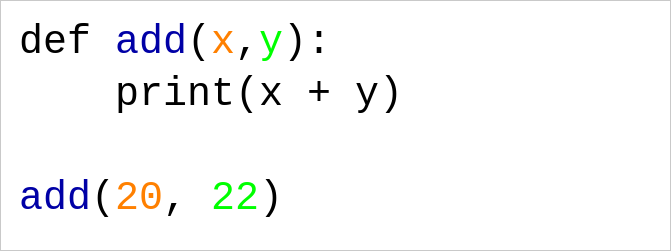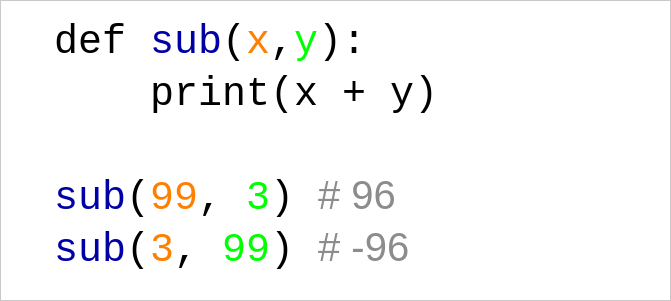Functions in Python
Created for
What are Functions?
What are Functions?
- A function is a named block of statements which perform one conceptual tasks.
- A typical example for a function, in the real life, is a recipe in a cooking book.
- The statements in the function are performed only after the function is called.
- Functions help us to organise our code (break a task into sub-tasks)
Function Definition
Function Definition
def function_name(opt_param_list):
'''docstring'''
statements
return [expression]
- def
- A keyword that starts the function definition
- function_name
- Should be valid variable name.
- opt_param_list
- Optional. A list of function parameters. The braces around it are required, even if the list is empty.
- '''docstring'''
- Optional. A string for function documentation.
- statements
- block of statements, also called function body
- return [expression]
- Optional. Specify what the return value of the function should be.
The pass statement
- Sometimes you need to define a function which body will be later written. But Python did not allows empty blocks!
- In such cases, you can use the
passstatement for function body:
def my_fun():
pass
You can use the pass statement anywhere in your code, where you need a "do nothing" block!
simplest example
def greet():
"""Just prints hello"""
print("Hello!")
Note, this code will not print anything if you try to run it as is.
This is just the function's definition. In order to execute the statements in it, the function should be called!
Function Call
Synonyms: Function Execution; Function Invocation
Function Call
The statements in the body of a function will be executed only when the function is called:
function_name(opt_arg_list)
# execute the greet() function:
greet()
Note, the braces after the function name are required!
A function must be defined before you call it, or a NameError will be raised!
# execute the greet() function:
greet()
# define greet() function:
def greet():
print("Hello!")
print(5/2)
# NameError: name 'greet' is not defined
function call - the right way:
# define greet() function:
def greet():
print("Hello!")
# execute the greet() function:
greet()
# Hello!
Function Parameters
Function Parameters
- A function is not very useful if it operates on same values
def add():
print(2+3)
add()
add()
add()
# 5
# 5
# 5
- It will be better if we could do:
# call add with different arguments:
add(20, 22)
add(123, 321)
add(16, 10)
# 42
# 444
# 26
- You can define a function to use parameters by listing them in the braces.
- Parameters names should be valid variable names.
- When you call a function, you list in the braces the respective parameters values (called arguments)
- Parameters are local function variables which get values when the function is called with the respective arguments.

Positional Arguments
- Passing arguments values to parameters can be done by position. In this case, we speak about positional arguments/parameters:
- first parameter gets the value of first argument
- second parameter - the value of second argument
- and so on...

Positional Arguments
- The number of arguments passed must be equal to the number of parameters!
def sub(x,y):
""" subtracts y from x and prints the result """
print(x - y)
sub(99)
# TypeError: sub() missing 1 required positional argument: 'y'
sub(99, 3, 3)
# TypeError: sub() takes 2 positional arguments but 3 were given
But you can use default parameters values.
Default Parameters Values
- A default value to the "trailing" parameters can be defined, and that value will be used if no argument for that parameter is passed.
def greet(name="Nobody"):
""" greets a user """
print("Hello", name)
greet("Maria")
greet()
# Hello Maria
# Hello Nobody
Default Parameters Values
Default parameters must follow the non-default parameters!
def greet(msg="Hi", name):
print("{} {}!".format(msg, name))
greet("Maria")
# SyntaxError: non-default argument follows default argument
def greet(name, msg="Hi"):
print("{} {}!".format(msg, name))
greet("Maria")
# Hi Maria!
Keyword (named) Arguments
- If you explicitly state the parameter name in the argument list, that parameter will get its value, no matter of where it is positioned.
def greet(msg, name):
print("{} {}!".format(msg, name))
greet(name="Maria", msg="Hi")
Keyword (named) Arguments
Named arguments must follows the positional arguments!
def greet(msg, name):
print("{} {}!".format(msg, name))
greet(name="Maria", "Hi")
# SyntaxError: positional argument follows keyword argument
Variable Number of Positional Arguments (*args)
- You can define a function with variable number of parameters if you unpack them in a tuple with the * (star) operator.
def add(*args):
add = 0
for item in args:
add += item
print(add)
add(1, 2)
add(1, 2, 3)
add(1, 2, 3, 4)
The name args can be any valid variable name, but its a convention to name the unpacked arguments with args
Variable Number of Positional Parameters (*args)
Variable arguments must follow the positional arguments:
def add(p1, *args):
print(p1, end=", ")
print(args)
add(1, 2)
add(1, 2, 3)
add(1, 2, 3, 4)
# 1, (2,)
# 1, (2, 3)
# 1, (2, 3, 4)
Variable Number of Keyword Parameters
- You can use
**(double stars) to unpack dictionary into keyword parameters.
def menu_print(fruit, price):
print("{:.<20s}{:.2f}".format(fruit,price))
menu_print(**{
"price": 2.5,
"fruit": "apple"
})
# apple...............2.50
Unpacking arguments into positional parameters
- You can unpack a list/tuple passed as argument into listed positional parameters with
*operator
def my_func(p1,p2,p3):
print(p1, p2, p3)
args = [1,2,3]
my_func(*args)
# 1 2 3
Note, that if you miss the star in my_func(*[1,2,3]), Python will assign the whole list [1,2,3] to p1, and the rest of parameters will receive no value. That will throw an error!
Function Return Values
Function Return Values
return statement
- Functions in Python can return values, using the
returnstatement:
def f():
statements
return [expression]
def add(x,y):
return x+y
print(add(2,4)**2)
# 36
The return statement exits a function!
def add(x,y):
return x+y
# next line will never be executed:
print("After return")
print(add(2,4))
Default return value
- If a function did not have an explicit
returnstatement, or if there is no expression afterreturnkeyword, then the function return value is None
def foo():
print("foo() was executed!")
def bar():
print("bar() was executed!")
return
print( foo() )
print( bar() )
# OUTPUT:
# foo() was executed!
# None
# bar() was executed!
# None
Variables Scope
Variables Scope
What?
- The scope of a variables defines the place in our program, where a variable can be accessed (used, visible).

Local Scope
- Names created inside a function are local to the function and are visible only inside that function
def f1():
y = 2
print("y = {} inside f1(): ".format(y))
f1()
# y = 2 inside f1()
print("y = {} outside f1(): ".format(y))
# NameError: name 'y' is not defined
Global Scope
- A name defined outside any functions is global to the file/module, and can be accessed after its definition from any place in that file/module.
x = 10
def f1():
print("x = {} inside f1()".format(x))
f1()
# x = 10 inside f1()
print("x = {} outside f1()".format(x))
# x = 10 outside f1()
Names Resolution
- When a name is defined inside function body, that name is created in function local scope (if the global keyword isnot used), even if the same name is already defined in global scope
x = 10
def f1():
x = 99
print("x = {} inside f1()".format(x))
f1()
# x = 99 inside f1()
print("x = {} outside f1()".format(x))
# x = 10 outside f1()
Variables with same name, defined in different scopes are considered as different variables!
Exercises
Task1: BMI with functions
Task
- Write a program which will calculate a user BMI.
- Split your logic into functions, and organise your program as given bellow:
def get_user_data():
"""retrieves user data from the command line
Returns:
[dictionary] of the form:
{
"name" : "user_name",
"height": "user heigth in meters",
"weight": "user weight in kilograms"
}
"""
pass
def calc_BMI(w,h):
"""calculates the BMI
Arguments:
w {[float]} -- [weight]
h {[float]} -- [height]
Returns:
[float] -- [calculated BMI = w / (h*h)]
"""
pass
def calc_BMI_category(bmi):
"""Calculates the BMI category
Arguments:
bmi {[float]} -- [the bmi number index]
Returns:
[string] -- [bmi category]
"""
pass
def print_results(bmi_category):
"""[Prints the BMI category to the user ]
Arguments:
bmi_category {[string]} -- []
"""
pass
def cm_to_meters(cm):
"""converts centimetres to meters
Arguments:
cm {[int]}
Returns:
[float]
"""
pass
user_data = get_user_data()
bmi = calc_BMI(user_data["weight"],user_data["height"] )
bmi_category = calc_BMI_category(bmi)
print_results(bmi_category)
Task2: Check user input
- Improve the function
get_user_data()defined in Task1, adding a check for valid user data: - User name must be at least 2 characters long
- User's height must be in the range: [50 - 250]
- User's weight must be in the range: [5 - 300]
- If the user enters wrong data, ask for input again.
- Define a separate function for each check, which will return True if the user input is valid, and False - otherwise.
Submition
- You can write both of the tasks in one file: prefix_bmi_with_functions.py
- where prefix is your name initials
- For instance: iep_bmi_with_functions.py
- Send it to progressbg.python.course@gmail.com
These slides are based on
customised version of
framework

